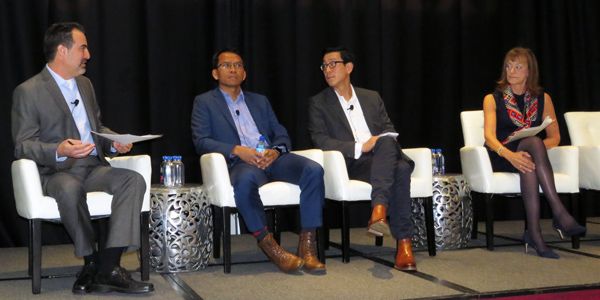By Rich Heidorn Jr.
WASHINGTON — A panel on investing in grid innovation and clean energy infrastructure last week gave Congress low marks and said emerging economies are proving quicker to adopt some technologies. But speakers at the GridWise Alliance’s GridCONNEXT conference said they are bullish on the future.
David Yeh, a White House adviser during the Obama administration who is now managing director of Capitol Hill, an advisory firm for high net worth individuals, global asset managers and start-ups, said he is not overly concerned with the Base Erosion Anti-Abuse Tax (BEAT) provision in the tax bill passed by the Senate earlier this month. Some renewable advocates fear the language, which is intended to prevent multinational corporations from moving profits and jobs out of the U.S., will reduce the value of wind and solar tax credits.
“Right now clean energy, especially at the utility scale, is competitive, if not cheaper than, fossil fuel energy. So, you can talk about regulation; you can talk about policy. But economics will trump all of that.
“This year, clean energy funds raised about $5 billion, while fossil fuels have raised about $2 billion. That’s showing what the demands are from the … capital providers [and allocators] of this world. … These are sovereign wealth funds; these are pensions; these are large, super high net worth families. … This is how the capital markets — and these are capital markets that start with a ‘T’ — trillions — view clean energy infrastructure. When they move their allocation from 1% to 5%, that’s a game changer. And they’re moving towards that.”
Have Peakers Peaked?

Nancy Pfund, founder and managing partner of DBL Partners, predicted that there will be few gas-fired peaking plants built in California in the future.
“They’re expensive. People don’t like them. They’re [crude] compared to solar and storage or wind or demand response or any combination. That’s an example that you have to let go of what the 20th century was all about. This is really different and if you stand in the way … of consumers who want their solar or want batteries, they are going to run you over.”
An ‘F’ for Policymakers
Policymakers in D.C. haven’t heard that message, however, she said, as reflected in “the $4 billion worth of annual subsidies that the fossil industry gets.”
“If the people on Capitol Hill were in a public policy class or business school course, they would get an ‘F’ because [they are subsidizing] an industry that’s 100 years old. I think anyone in our [clean energy] industry would say we would love a level playing field. Get rid of all incentives. But it’s kind of a ‘David and Goliath’ story at this point.”
Puon Penn, executive vice president and head of technology capital for Wells Fargo, said investors would be wise to look past the U.S. to China and other growing economies that have committed to abandoning the internal combustion engine in favor of electric vehicles.
“Do you think the [original equipment manufacturers] … the Fords and the GMs are looking at the United States as their primary market today? They sell more vehicles in China. And if you’ve got to make electric vehicles for the Chinese market, you’re damn well not going to make a bunch of internal combustion vehicles for the United States. You’re just going to build one platform that you’re going to distribute across the planet. It’s inevitable. But people are still behaving like we’re still [the] Jolly Green Giant walking the earth and determining the order of things. We’re not anymore.”
Penn said new technologies are allowing greater capacity utilization in the electric industry than in the past. “There’s no other industries where you have high [capital expenditures] and such low capacity utilization,” he said. “Today we do have the wherewithal to increase capacity utilization and therefore benefit the entire economy.”





